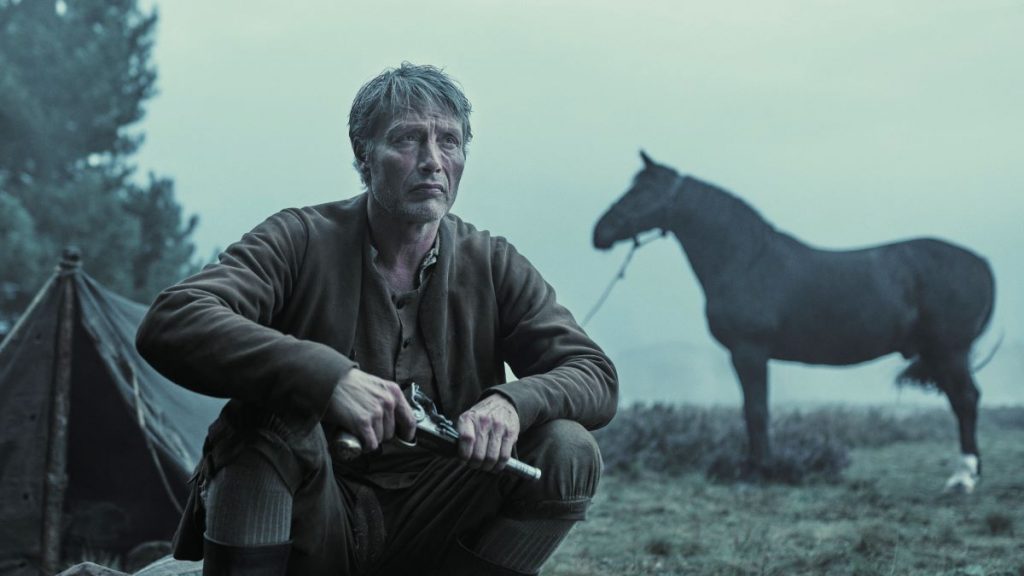Reviews include Deadpool & Wolverine, Doubles, and Mountain Queen: The Summits of Lhakpa Sherpa.
TFCA Friday: Week of Feb. 9
February 9, 2024

Welcome to TFCA Friday, a weekly round-up of film reviews and articles by TFCA members.
In Release this Week
Cobweb (dir. Kim Jee Woon)
“Cobweb tarring Song Kang–ho who you know from Parasite is many things – horror, thriller, puzzle, satire, whodunnit, comedy, and ultimately utter chaos. A film production company working under a woman who has just inherited the job has wrapped on ‘Cobweb’, from auteur director Kim,” notes Anne Brodie at What She Said. “But he’s not happy; he dreams a new ending and insists the cast and crew return ‘for one day’s work.’ Famous last words. Beautiful to look at with sweeping cinematography of the film within a film, in an ancient grand home, seen in deep contrast light and shadow, black and white, suggesting labyrinths of despair and beauty.”
Float (dir. Sherren Lee)
“For a teen romance, the story is corny and filled with clichés complete with obstacles to the romance and makeup at the end,” says Gilbert Seah at Afro Toronto. “The chemistry between the two actors does not quite work well, a factor being that actress Bang looks a bit too young for her age and her settling down to an adult forever relationship is too unbelievable.”
How to Have Sex (dir. Molly Manning Walker)
“How to Have Sex follows the time-honoured themes of a coming-of-age story with great sensitivity and subtlety,” writes Rachel Ho at Exclaim!. “Manning Walker, who pulls double duty as screenwriter, gives Tara the moderate temperament the vast majority of audiences will relate to — never all the way confident but not meek in the slightest, she’s simply a young woman trying to understand her place and make sense of what her world can offer.”
“Manning Walker’s devastating, multi-award-winning party on story morphs into a provocative thinkpiece when Tara’s nonchalantly raped – twice – by one of the boys,” writes Anne Brodie at What She Said. “She is unable to respond, in shock, not sure how it happened or how to react, and her magnetic, fun-loving attitude vanishes. She’s now masking anger, sadness, and horror. One of the boys and Em intuit what happened and support her, but she’s immobilised. Simply shot in continuous naturalistic sequences, many seemingly unrehearsed, Manning Walker’s precise direction and that jewel of a script inspire a deeply emotional, primitive response.”
“How to Have Sex is adroitly constructed, allowing the audience to enjoy the crazy first half of the film and then moving us into an emotional engagement with Tara, who is confused and distraught after having had sex with Paddy,” notes Marc Glassman at Classical FM. “She doesn’t properly convey how upset she is to Skye and Em, who initially think that being with Paddy was a good thing. Ironically, it’s Badger who tries to help her, offering the classic British tea and sympathy. In a problematic scene, the sleepy Tara is raped (perhaps unintentionally) by Paddy, though the full consequences of the situation are arrested by the arrival in the bedroom of several others.”
“Late in How to Have Sex, a lingering shot surveys the morning-after mess left by revelers on a street that had been slammed the night before. Tara is eventually seen making the so-called ‘walk of shame’ down the deserted, detritus-lined avenue, her blazingly bright outfit in stark contrast to the grimy scene framing her,” says Kim Hughes at Original Cin. “It’s a fitting metaphor for how the film, which scored the top prize in the Un Certain Regard section at Cannes last year, subtly but unmistakably conjures the horrors of the morning after, when choices — both our own and those of others with agendas — are starkly seen.”
“Despite its playful-sounding title, the film delves into serious territory and covers the material well and with flair,” notes Gilbert Seah at Afro Toronto.
Hundreds of Beavers (dir. Mike Cheslik)
“A sly mix of animation, stop motion, black and white, and virtually wordless, Beavers begs the question ‘How in heck did they do it?’ The screen explodes with offbeat, utterly outrageously funny bits, and plenty of original songs you just know are nutty if you could only make out the lyrics,” laughs Anne Brodie at What She Said. “A masterpiece of mayhem, pleasing to the eye and heart, somehow timeless and unforgettable. It’s a tad long for such energy, so pace yourself.”
Lisa Frankenstein (dir. Zelda Williams)
“Lisa Frankenstein is not very good – which is a real pity as the film excels in many departments like make-up and wardrobe – generally superior production values and a clever premise that does not translate well into funny comedy,” admits Gilbert Seah at Afro Toronto.
“Lisa Frankenstein can be fun, but there is a mean-spiritedness to Cody’s script that doesn’t fit with the film’s premise. It comes mainly at the hands of the creature whose victims are far from charming but don’t necessarily deserve the extreme comeuppance that’s dealt to them,” says Thom Ernst at Original Cin. “And Lisa’s quick turnaround from appalled bystander to full-on accomplice robs her of the audience’s empathy. For a film that stacks sentiment like blocks from a Jenga tower, Lisa Frankenstein is surprisingly void of empathy. It can feel like a movie in search of the right mood.”
Lover, Stalker, Killer (dir. Bob Hobkinson)
“The doc unfolds in true Hitchcock fashion in which director Hobkinson always keeps audience anticipation at its height,” writes Gilbert Seah at Afro Toronto. “The audience is set up for a murder in which they are kept guessing as to which one is the victim and who would be the stalker and killer.”
Max Roach: The Drum Also Waltzes (dir. Sam Pollard and Ben Shapiro)
“Pollard and Shapiro’s film doesn’t quite gel like jazz, and many times things feel a bit more straightforward and predictable than intended. Speaking both to audiences familiar with the narrative and to neophytes alike, it’s as if they can’t quite decide which audience is the intended one,” says Jason Gorber at POV Magazine. “While the form of the film is far more straight ahead than Roach’s own impressive art, this portrait of a percussionist still manages to both commemorate a legend as well as speak to how the repercussions of his percussion continues to resonate to this various day in almost all forms of musical expression.”
My Sole Desire (dir. Lucie Borleteau)
“Director Boreleteau does her best to make her film as erotic as she can with grinding dances and often with girl on girl movements,” observes Gilbert Seah at Afro Toronto. “But all this gets to be a bit boring, especially when there is nothing concrete in the story or build up in the protagonist’s character. It doe3s not take a genius to see where the film is headed in terms of story, not that anyone cares. The silly tacked on happy ending where everyone comes together in a big party does not work either.”
Orah (dir. Lonzo Nzekwe)
“Orah is an odd hybrid, a story of immigration and the way it can fracture families, and also a straight-up revenge thriller with cops and bad guys and guns. The two gears don’t always mesh perfectly, but it’s a wonder they work nearly as well as they do,” writes Chris Knight at Original Cin. “Oladejo is a fine actor, and I was sometimes in awe of what she was able to signal with just the slightest facial twitch. But not everyone else in the film is on par with her talent, which means that sometimes the script is required to do more heavy lifting than is healthy.”
Perfect Days (dir. Wim Wenders)
***TFCA Award Nominee: Outstanding Lead Performance – Koji Yakusho***
“Wim Wenders’ meditation on the everyday is a deep delight. Days in which a toilet cleaner carries out his morning and evening routines, does his job, takes a few simple pleasures and glory in the beauty of life, within busting Tokyo, with occasional human contact. C’est la vie,” writes Anne Brodie at What She Said. “Koji Yakusho is Hirayama, a toilet janitor journeyman whose thorough, detailed cleaning of public rest stations is not just a job, but a calling for a man of habit and precision. In the morning, he folds up his bed precisely and unfolds it precisely at night. Driving from toilet to toilet he smiles, listens to American rock of the 60s and 70s from his tape cassette collection, and finds wonder in the fluttering patterns made by trees and leaves against the sun; he photographs them. Life is good.”
“I sometimes wished for a bit more information, backstory or history of the main character, whose family life is tantalizingly hinted at in the segment where his sister’s young daughter briefly crashes at his place,” says Chris Knight at Original Cin. “Then again, that desire on the part of the viewer to know more is also the hallmark of a great character and an expertly crafted film, someone who feels like you could shake their hand and strike up a conversation, something that feels real enough to step inside, look around and explore. Perfect Days is both those things, and much more besides.”
At the Toronto Star, Peter Howell speaks with star Koji Yakusho about his performance that scooped Best Actor at Cannes. “Yakusho didn’t just walk into the role,” writes Howell. “He learned how to properly scrub and spruce up a washroom from a professional cleaner from The Tokyo Toilets, the same company Hirayama works for in the film. ‘There was a cleaner from The Tokyo Toilets who I followed around for two days,’ [Yakusho says.] ‘They showed me how to clean all the toilets and there were also all these how-to videos. I watched them many times and by the end of it they really complimented me. They said, ‘You know, you can start working for us any day!’'”
The Promised Land (dir. Nikolaj Arcel)
“Arcel, scared stiff from Hollywood’s boardroom-guided production style that resulted in his Dark Tower flop, manages to wring a message from the mud. Instead of squeezing blood from a stone, maybe ask yourself if there’s something you might appreciate more than a bruised hand full of blood anyway,” writes Jackson Weaver at CBC. “That’s on top of seeing Mikkelsen clearly thrive in the sort of role he only goes to Hollywood in order to finance. His performance here is as brooding, nuanced and brutal as Valhalla Rising — with the same contradictory traits of a clearly violent man softened by the unfortunate foundling dumped on his doorstep.”
“The Promised Land is visually splendid and utterly absorbing, a rags-to-riches/vengeance/love story packed with action and heartbreak. Nearly every frame rests squarely on Mikkelsen and the gravitas he brings to this role; he is ably supported by a cast that includes Kristine Kujath Thorp, Gustav Lindh, and Melina Hagberg,” observes Liz Braun at Original Cin. “Written by Arcel and Anders Thomas Jensen, the film is based on the novel The Captain and Ann Barbara, by Ida Jessen. This is intense storytelling that illustrates the terrible divide between the haves and have-nots, not to mention the racism and ignorance of the time and the corruption at the top — making The Promised Land entirely contemporary, despite the historical setting.”
“There is also much to learn, history and geography from the film, in terms of offering methods, instruments and apparatus in surveying and farming the land,” says Gilbert Seah at Afro Toronto. “The cinematography depicting the harsh first and blowing winter snow and ice are also stunningly depicted.”
“So a primal battle of wills as alarming and dramatic as this reviewer has seen in a while. de Schinkel finds joy in torture and murder; the couple leaves the heath in fear of him, so Kahlen hires local highwaymen and women to till the rock fields,” notes Anne Brodie at What She Said. “Anmai Mus (Melina Hagberg) a little girl comes into his life, she’s as headstrong and determined as he is. The final chapter’s savagery, torture, and madness take the breath away; all the more stunning because the film is based on fact. Buckle up for a very hard ride – albeit beautifully executed.”
“There’s betrayal and love and way too many deaths to recount in the violent, gripping final third of the film,” says Marc Glassman at Classical FM. “Suffice it to say that The Promised Land meets genre expectations, keeping the narrative moving briskly while deepening our interest in the main characters, which gradually includes Anmai Mus, and, by extension, her people, who are treated abysmally by Danes and Germans. It’s heartening to see Arcel protest racism towards the Romani, a condition that exists today.”
“It is as emotionally and narratively punishing as it is beautiful, the sweeping vistas of rural Denmark offering an open-skied escape from the struggles on the ground below,” adds Barry Hertz at The Globe and Mail. “Ultimately, The Promised Land is a testament to not only the resilience of Denmark’s agricultural homesteaders – it wouldn’t be a surprise if the movie was, in fact, a stealth ad for the country’s potato industrial complex – but also to the fierce power of Mikkelsen’s presence. Survival of the fittest, indeed.”
“They certainly don’t make historical epics like they used to. The Promised Land feels like it is of another time, when costume dramas flourished and gladiators ruled the big screen,” says Rachel West at That Shelf. “A throwback epic in the very best way, director Nikolaj Arcel tells a truly compelling story with superlative pacing to deliver a comprehensive tale that feels much bigger than its 127-minute runtime.”
Sometimes I Think About Dying (dir. Rachel Lambert)
“We are meant to share in Fran’s ennui; the sound of office chatter and corporate-speak is grating, and the most thrilling incident is some light flirting about curds versus cheese. However, the film’s intended unpleasantness can move from deadpan – at times reminiscent of Swedish director Roy Andersson’s austere and anemic images – to laborious or dispossessed of meaning,” writes Saffron Maeve at The Globe and Mail. “But the film does not heed Fran’s own dilemma of detachment and forced aloofness.”
“Fran (Ridley) is an awkward silence on legs. Living alone without even a cat for company, her dinner one night consists of cottage cheese on toast and a single glass of red wine, which she consumes while standing at the table,” notes Chris Knight at Original Cin. “And yet just when I thought I had her character pegged, she surprised me. I thought this might be one of those movies where we know someone is on the spectrum because their fridge is filled with exactly one type of food, and they are unable to relate meaningfully with other humans.”
Spotlight (dir. Laura Chinn)
“Laura Chinn’s semi-autobiographical coming-of-age story deals with a fraught mother-daughter relationship failing under the strain of a dying son and brother,” notes Anne Brodie at What She Said. “Doris’ girl gang understands and supports her and offers her the life of the average teen. Interesting portrait of a bad mother whose dedication to one child far outweighs the value – to her – of the second. And a lively portrait of teen life, the best parts of the film set against Doris’ sad, cold life as her mother’s daughter. A mixed bag.”
Your Fat Friend (dir. Jeanie Finlay)
“Your Fat Friend ultimately provides an informative but vivaciously funny journey of acceptance as it shares Aubrey’s voice on another platform as she seeks to break the stigma around size,” writes Pat Mullen at POV Magazine. “The film, like Aubrey’s work, lets people feel seen and heard. Its message is important, especially when screened in any theatre with teeny tiny seats—or, better yet, on an airplane to inspire an empathetic look at the people around you.”
Is the Canadian Screen Sector Doing Ok?
At The Globe and Mail, Barry Hertz reports from Prime Time in Ottawa where various players and stakeholders in Canadian film and television convened to share some dire snapshots of the state of the Canadian screen sector. “On the global side of things, the streaming wars – a battle thought to be in its dying days, albeit with further conglomeration and widespread layoffs before any white flag is flown – has domestic producers scrambling to sell projects to international giants before budgets dry up,” writes Hertz. “But the persistence of high interest rates in the U.S. has slashed budgets of productions that did manage to find a home, while executives burned by the two major Hollywood strikes are stuck in a risk-averse mindset. And if you are lucky enough to get your series or film made, then good luck finding an audience that has not been overwhelmed by choice for years.”
Hertz also reports at The Globe and Mail that any celebrations of Canadian screens will be delayed with the Canadian Screen Awards moving to spring: “The Canadian Academy chalks up the shift to a change in venue availability, with this year’s CSAs moving to the CBC Broadcast Centre in Toronto, after being held at Meridian Hall last year,” writes Hertz. “One other shift is the CSAs broadcast show moving away from its traditional Sunday-night slot. Traditionally, the televised version of the CSAs – which has taken on different forms over the past few years due to the pandemic and other creative decisions – airs on a Sunday evening. This year, the 12th edition will air on CBC and CBC Gem on May 31, a Friday.”



